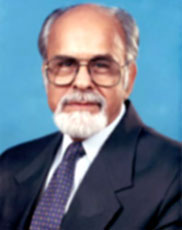 Inder Kumar Gujral born 4 December 1919 was the twelfth Prime Minister of the Republic of India. Born in the town of Jhelum in Western Punjab, now in Pakistan, he actively took part in India`s freedom struggle, and was jailed in 1942 during `Quit India Movement`.
Inder Kumar Gujral born 4 December 1919 was the twelfth Prime Minister of the Republic of India. Born in the town of Jhelum in Western Punjab, now in Pakistan, he actively took part in India`s freedom struggle, and was jailed in 1942 during `Quit India Movement`.
Child-Hood
Son of Late Shri Avtar Narain Gujral and Late Smt. Pushpa Gujral, Shri Gujral is M.A., B.Com. Ph.D. & D.Litt. Shri Gujral belongs to a family of freedom fighters both his parents participated in the freedom struggle in Punjab. At the young age of eleven, he himself actively participated in the freedom struggle in 1931 and was arrested and severely beaten by the police for organising movement of young children in the Jhelum town.
Achievements
Before assuming the office of the Prime Minister of India, Shri Gujral was the Minister of External Affairs from June 1, 1996 and held additional charge of the Ministry of Water Resources from June 28, 1996. He was the Minister of External Affairs earlier during 1989-1990. He was Ambassador of India to U.S.S.R. (Cabinet Rank) from 1976-1980. I.K. Gujral held the following Ministerial positions from 1967-1976:
Minister of Communications & Parliamentary Affairs;
Minister of Information & Broadcasting and Communications;
Minister of Works & Housing;
Minister of Information & Broadcasting; and
Minister of Planning.
He was also appointed as India`s ambassador to Russia. By the time of Indira Gandhi`s return to power in 1980,as the Indian envoy to Moscow, Gujral persuaded her to express opposition to the Soviet Union`s 1979 invasion of Afghanistan. Gujral left the Congress Party in the mid1980s and joined the Janata Dal. The Dal was a third-party with mainly socialist leanings and regional bases. In 1989 elections, Gujral was elected from Jallandhar parliamentary constituency of Punjab.
He served as Minister of External Affairs in V.P.Singh cabinet. The issue he had to deal with as External Affairs Minister was Iraq`s invasion of Kuwait and the subsequent events that led to first gulf war of January 1991. As India`s representative, he personally met with Iraq`s Saddam Hussein. His hug with Hussein during the meeting remains a matter of controversy. In 1991 mid-term parliamentary elections, Gujral contested from Patna constituency in Bihar against Janata Dal(S) candidate and then Finance Minister Mr. Yashwant Sinha. However the election was countermanded following complaints of large scale irregularities.
Gujral then became the 12th Prime Minister of India. He continued in the office for over 11 months, including 3 months as caretaker Prime Minister. During this time, he attempted to improve relations with Pakistan, reform the aging institutions of government and promote pro-growth economic policies to bring the country out of the 1997 Asian financial crisis, which had left it stagnant. But the fractious, corrupt and unstable coalition politics were too big a hurdle. However, I.K. Gujral had the distinct privilege and honor of leading the country in its 50th year of independence, a year of pride and major celebrations of the country`s diversity, vibrant cultural fabric, achievements of the past five decades, and of course, honoring the national freedom struggle and its veterans.
He speaks fluent Urdu, the national language of Pakistan, and spends part of his leisure time writing Urdu verses, a poetic form that traces back to India`s Mogul emperors.




















